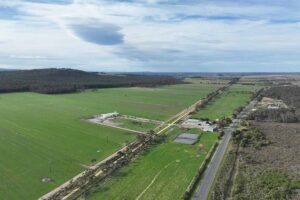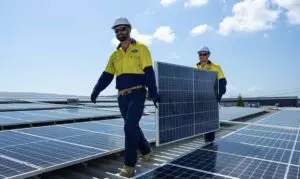Federal Labor leader Anthony Albanese has all but dismissed the prospects of a cross-bench bill to secure a target of zero net emissions into law, saying there is little chance of bipartisan support, although he did suggest a new coal-fired power station in Australia was more unlikely, comparing it to a “unicorn”.
Speaking to ABC’s RN Breakfast program on Tuesday, Albanese said that while proposed legislation released by Independent MP Zali Steggall to commit Australia to a zero emissions target was “very well intentioned”, it was unlikely that the Morrison government would ever agree to bring on debate of the bill.
He suggested that because of this, Labor may not support it, although other Labor MPs, including climate change spokesman Mark Butler later tried to play down those comments, saying they were keen to engage with the Warringah independent.
Steggall released proposed legislation this week that would see a commitment to a target of achieving zero net emissions by 2050 into law, as well as a framework for the federal government to develop and update plans for reducing emissions and adapting to the impacts of climate change.
See also: Energy Insiders Podcast: Can Zali Steggall bridge the climate divide?
With the bill, Steggall is targeting moderate members of the Coalition, hoping to draw out supporters who would be willing to cross the floor of parliament to support it. But the Labor opposition has been quick to downplay these prospects, saying that it is being “realistic” about the very unlikely proposition of Coalition members breaking ranks over the climate change legislation.
Stegall has called for a conscience vote on the bill, and Labor’s support for the bill would be crucial to any prospects of the bill being debated and passed in the Parliament.
Albanese avoided discussing the merits of the bill in an interview with the ABC, saying it was unrealistic to expect that it would ever be debated by the parliament.
“You know that that bill will never be voted on,” Albanese told ABC’s RN Breakfast program. “That’s what happens with private members bills in the House of Representatives.”
“The way that you change climate policy in this country is to change the government and to elect a Labor government.”
Butler later issued a statement following Albanese’s interview, reassuring Steggall and the crossbench independents that the Labor party would collaborate on the bill, but agreed that its fate would ultimately be decided by Scott Morrison.
“Labor welcomes any constructive effort to progress climate action and looks forward to continuing to engage with Zali Steggall about her Climate Change Bill,” Bulter said.
“For Zali Steggall’s Bill to be considered, Scott Morrison would need to allow a full debate in the Parliament.”
“When Labor moved a motion to declare a Climate Emergency last October, Scott Morrison wouldn’t allow the question to be debated at all.”
Albanese also criticised the Morrison government providing funds to undertake feasibility studies into new coal-fired power station projects. Last week, federal energy minister Angus Taylor announced that $4 million had been provided to fund a feasibility study into a new coal-fired power station in Queensland.
The Morrison government has also promised to support a possible extension to the operating life of the coal-fired Vales Point power station as part of a deal with the NSW government
Albanese pointed to the leaked findings of the Liddell power station task force, which found that it would cost $300 million to extend the life of the ageing power station, without improving the power station’s reliability.
Albanese would not say whether a Labor government would block the construction of new coal-fired power stations in Australia, but said that it was a non-issue as it was not financially viable.
“You might as well ask me if I support unicorns,” Albanese said. “We have a position which is that it does not stack up. It will not proceed.”
“Right now, there is nothing to stop a private sector operator establishing a coal fired power plant.”
“What Labor wants to see is investment in clean energy. I do not think there is a place for new coal-fired power plants in Australia. Full stop.”
Steggall’s bill, which is being co-sponsored by fellow independents Helen Haines, Rebekha Sharkie and Andrew Wilkie, has won support from several business groups, including the Clean Energy Council, the Business Council of Australia and the Australian Industry Group.
“The Bill introduced by Zali Steggall today draws on the experience of the United Kingdom and other countries to outline a positive national response to the challenges of climate change and emissions reduction,” CEO of the Clean Energy Council Kane Thornton said.
“The fact that the Bill has already received support from a number of cross-benchers provides hope that we can finally leave the past decade of political squabbling behind us and move on with our transition to a low-carbon economy, to which renewable energy will continue to play a significant role.”
The Morrison government commands a slim majority within the House of Representatives, with at least three Coalition members needing to cross the floor for any non-government legislation to pass.
While Albanese said that Labor would soon commit to a “long term target” for reducing emissions, he stopped short of specifying exactly what that target would be.
Labor’s emissions reduction targets are currently being considered by the Federal party room, and an announcement on Labor’s position is expected in the coming months.
Labor took a target of reducing emissions by 45 per cent by 2030 to the 2019 election but has since walked back that position after the re-election of the Morrison government.
While it is likely that Labor will commit to a 2050 target for net zero emissions, the opposition party may move to a different set of interim targets, arguing that the timeline to 2030 is now too short, particularly given the prospect that Labor may not be able to form government before an election held in 2022.







